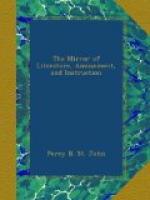As we love “a jest’s prosperity,” we recommend such of our readers as are partial to innocent pasquinade, to turn to the “Lyric,” in a recent volume of the New Monthly Magazine, commencing as above. It is too long for entire insertion here, but its raciness will doubtless gratify those who may be induced to refer to it.
* * * * *
Tremendous rains.
(For the Mirror.)
Like a low-hung cloud, it rains so fast,
That all at once it falls.—Dryden.
There are two English proverbs relative to rain; the first is, “It rains by Planets.” “This the country people (says Ray) use when it rains in one place and not in another; meaning that the showers are governed by planets, which being erratic in their own motions, cause such uncertain wandering of clouds and falls of rain. Or it rains by planets—that is, the falls of showers are as uncertain, as the motions of the planets are imagined to be.” The second—“It never rains but it pours:” which appears to be the case at present. In the year 553 it rained violently in Scotland for five months; in 918 there was a continual rain in that country for five months; a violent one in London 1222; again 1233, so violent that the harvest did not begin till Michaelmas; 1338, from Midsummer to Christmas, so that there was not one day or night dry together; in Wales, which destroyed 10,000 sheep, September 19th 1752; in Languedoc, which destroyed the village of Bar le Due, April 26th, 1776; and in the Island of Cuba, on the 21st of June, 1791, 3,000 persons and 11,700 cattle of various kinds perished by the torrents occasioned by the rains.
P. T. W.
* * * * *
Curious scraps.
(For the Mirror.)
The first dissection on record, is one in which Democritus of Obdera, was engaged, in order to ascertain the sources and course of the bile.—It was the custom among the Egyptians, to carry about at their feasts a skeleton, least their guests, in the midst of feasting and merriment, should forget the frail tenure of life and its enjoyments.
The most ancient eclipse upon record, was observed by the Chaldeans 721 years before the Christian era, and recorded by Ptolemy. The observation was made at Babylon the 19th of March.—In ancient days, for want of parchment to draw deeds upon, great estates were frequently conveyed from one family to another only by the ceremony of a turf and a stone, delivered before witnesses, and without any written agreement.—It is singular, that by the Doomsday Book, as quoted by Camden, there appears to have been in Lincoln, when that survey was taken, no less than 1070 “inns for entertainment.”—Henry I., about the year 1125, caused to be made a standard yard, from the length of his own arm, in order to prevent frauds in the measurement of cloth. This




